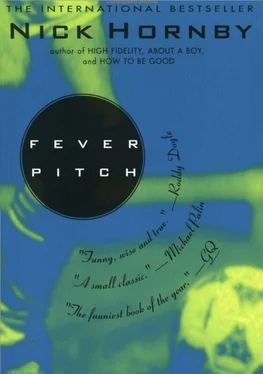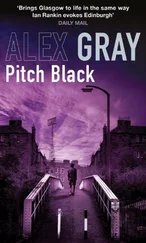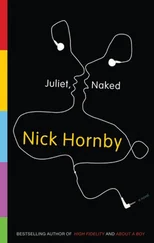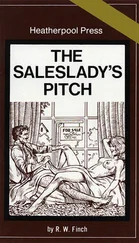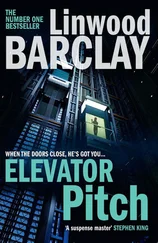When Walden beat Tiptree 3-0 and won something or other—the Essex Senior Cup?—on a mild May evening, there was a warmth to the occasion that professional football will never be able to match. A small, partisan crowd, a good game, a team of players with a genuine affection for their club (Les didn’t play for anyone else throughout his career, and like most of his team-mates lived in the town) … and when, at the end of the game, the crowd went on to the pitch, it wasn’t intended as an act of aggression, or bravado, or scene-stealing, as pitch invasions so frequently are, but to congratulate the team, all of them brothers or sons or husbands of nearly all of the spectators. There is a sourness that is central to the experience of supporting a big team, and you can’t do anything about it apart from live with it and accept that professional sport has to be sour if it is to mean anything at all. But sometimes it’s nice to have a little holiday from it, and wonder what it would be like if Arsenal players all came from London N4 or N5, and had other jobs, and played only because they loved the game and the team they played for. This is sentimental, but teams like Walden inspire sentiment; sometimes, you feel, it would be nice if the theme from the A-Team that marks Arsenal’s entrance on to the pitch wound down horribly, as the tapes did at Cambridge City, and the players looked at each other and laughed.
ARSENAL v LUTON
27.8.83
How can you not see omens everywhere? In the summer of 1983, after two years, I packed up my teaching job to be a writer; and a couple of weeks later Arsenal signed, against all odds, the hottest property in British football—Charlie Nicholas, the Cannonball Kid, the Celtic player who had scored fifty-something goals in Scotland the previous season. Now we were going to see something. And with Charlie around, I felt that there was no way I could fail with my witty yet sensitive plays, the first of which—oh, the unfathomable mysteries of creativity—was about a teacher who becomes a writer.
It is easy to see now that I should not have linked Charlie’s career to my own, but at the time I found it irresistible to do so. The optimism of Terry Neill and Don Howe and the press swept me along, and as the Charlie hype became more and more feverish during the summer of ’83 (he had, in truth, made a bit of an idiot of himself in the tabloids even before he kicked a ball), it became very easy to believe that the newspapers were talking about me. It was distinctly possible, I felt, that I was on the verge of becoming the Cannonball Kid of television drama, and then of the West End theatre (even though I knew nothing about either, and indeed had frequently expressed my contempt for the stage).
The neat and obvious synchronism of it all still baffles me. The last new dawn, back in ’76 when Terry Neill took over and Malcolm Macdonald came to the club, I was about to depart for university. And the one after Charlie’s arrival, just a year later (when we were top of the First Division for a couple of months, and playing as well as anyone could remember), came right after I walked out of various terrible messes I had made in Cambridge and moved back to London to start a new life. Maybe football teams and people are always having fresh starts; maybe Arsenal and I have more than most, and therefore we are suited to each other.
In the event, Charlie proved to be a pretty accurate indicator of my fortunes. I was there for this, his first game, of course, along with a good forty thousand others, and he was OK: he didn’t score, but he played his part, and we won 2-1. And though he got two in the next game, away at Wolves, that was it in the League until after Christmas (he got one League Cup goal at Tottenham in November). The next game at home, against Manchester United, he looked slow and out of touch, and the team were outclassed—we lost 3-2, but we were never really in the game. (In fact he didn’t score at all at Highbury until 27th December, with a penalty against Birmingham which we greeted with the fervour of a hat-trick against Tottenham.) His first season was, in short, a disaster, as it was for the whole team, and the manager, Terry Neill, got the sack after a dismal run of results in November and early December.
The other Cannonball Kid, the literary version, finished his imaginative play and got a kind and encouraging rejection letter back; then started another, which was also rejected, a little less kindly. And he was doing the most dismal sorts of work—private tuition, proof reading and supply teaching—to pay the rent. He showed no signs of scoring before Christmas either, or for a few more Christmases to come; if he had supported Liverpool, and tied his fortunes to Ian Rush, he would have won a Booker prize by May.
I was twenty-six in 1983, and Charlie Nicholas was just twenty-one; it suddenly occurred to me over the next few weeks, as I looked at the hundreds of Charlie haircuts and earrings on the terraces and regretted that my already thinning hair would not allow me to participate, that my heroes were not going to age as I did. I will reach thirty-five, forty, fifty, but the players never will: Paul Merson, Rocky, Kevin Campbell … I am more than a decade older than the people I love in the current Arsenal team. I am even a year older than David O’Leary, the veteran, the Old Man, whose pace is patently no longer what it was, whose first-team outings are limited to protect his creaking joints and his waning stamina. It doesn’t make any difference, however. To all intents and purposes, I am still twenty years younger than O’Leary, and ten years younger than all the 24-year-olds. In one important sense, I really am: they have done things that I never will, and sometimes I feel that if I could just score once into the North Bank end and run behind the goal to the fans, then I could at last leave behind all childish things.
CAMBRIDGE UNITED v OLDHAM ATHLETIC
1.10.83
It was the beginning of another typical Cambridge season. They’d won one, drawn a couple, lost a couple, but they always started like this; at the beginning of October my friends and I watched them beat Oldham (whose team, incidentally, included Andy Goram, Mark Ward, Roger Palmer and Martin Buchan) 2-1; they moved into comfortable mid-table obscurity, their natural habitat, and we went home fully and happily prepared for another season of nothingness.
And that was it. Between 1st October and 28th April they failed to beat Palace at home, Leeds away, Huddersfield at home, Portsmouth away, Brighton and Derby at home, Cardiff away, Middlesbrough at home, Newcastle away, Fulham at home, Shrewsbury away, Manchester City at home, Barnsley away, Grimsby at home, Blackburn away, Swansea and Carlisle at home, Charlton and Oldham away, Chelsea at home, Brighton away, Portsmouth at home, Derby away, Cardiff and Wednesday at home, Huddersfield and Palace away, Leeds at home, Middlesbrough away, Barnsley at home and Grimsby away. Thirty-one games without a win, a Football League record (you can look it up), seventeen of them at home … and I saw all seventeen, as well as a fair few games at Highbury. I missed only United’s home defeat by Derby in the FA Cup third round—the girl I was living with took me to Paris for the weekend as a Christmas present. (When I saw the date on the tickets, I was unable, shamingly, to hide my disappointment, and she was understandably hurt.) My friend Simon managed only sixteen of the seventeen League games—he smashed his head on a bookshelf in London a few hours before the Grimsby game on the 28th of December; his girlfriend had to take his car keys away from him because he kept making dazed attempts to drive from Fulham up to the Abbey.
Читать дальше
